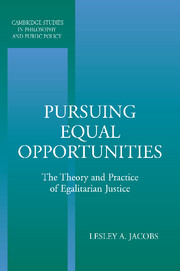6 - Justifying Workfare
Published online by Cambridge University Press: 05 June 2012
Summary
INTRODUCTION
The last two chapters focussed on the idea of race as a form of disadvantage and on legal remedies inspired by the three-dimensional model of equal opportunities as a regulative ideal. The activities of the courts and policymakers in the United States provided the context for the arguments I advanced in those chapters. The main reason is that by comparison with other advanced industrial countries, Americans have a wealth of experience – a litany of successes and failures – with race-explicit law and social policy. This chapter and the next shift the focus from race to class.
Class references generally involve two components – social differentiation and ranking. They are, first of all, a way to highlight similarities between some individuals while differentiating them from others. “Class labels,” notes Christopher Jencks, “provide a short-hand device for describing people who differ along many … dimensions simultaneously.” Class is not, however, just about social differentiation. It also denotes a system of ranking order, or what sociologists sometimes call “social stratification.”
Theories of class differ with regard to which forms of social differentiation are primary in explanations of class ranking or social stratification. Marxists, for instance, refer to the ownership and control of the means of production. Sociologists typically highlight social differentiation based on the sources of income – for example, from paid work, inheritance, capital investments, welfare, and so on. Many economists stress wealth and income.
- Type
- Chapter
- Information
- Pursuing Equal OpportunitiesThe Theory and Practice of Egalitarian Justice, pp. 145 - 168Publisher: Cambridge University PressPrint publication year: 2003



